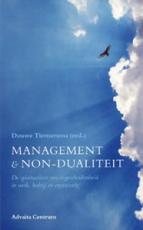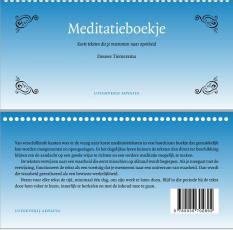Advaita Post 15-05 - The basic unity in every situation
Advaita Post, Volume 15 No. 5.
Text Satsang
From an Advaita talk with Douwe Tiemersma, Schiermonnikoog, February 6, 2005
The basic unity in every situation
With most spiritual traditions it's all about learning to see and experience certain things. These can be beautiful experiences or great truths. But when the person who has these experiences stays more or less the same, what's really changed? The experiences can be important for the person and so the person remains. In Advaita it's about a realization that is so radical that everything changes. The insight which breaks through means that a totally different situation arises. There is a realizing of how it is, while at the same time there an actualizing of that newness. Both go together. If you want to remain in a certain place and try to understand everything from there, it might become a bit clearer mentally, but that's all. You can do everything to gain wisdom, but when it stays with: "I know it," "I find that important", "I know this now", then you'll get a head full of wisdom while the old situation stays essentially the same. So you can stock all the bookshelves in your head, but it doesn't help much. It's about the complete realization of the absence of the old 'I'-person, the absence of the 'I'-person who says, "I think", "I know", "I understand". It's about that 'I' disappearing. The 'I' is a set of self-images, stories and cramps. It's just stories, it's just a little piece of tension. When you relax, there's nothing there anymore. You walk on the beach, the sea, the blue sky and there's no person to be seen. Actually, this situation is always already there. It's just that when you hold onto all kinds of things in your head it recreates the 'I'. When these wrong images disappear, when these contractions disappear, it's clear. See how easily this clarity is disrupted again when you recreate certain images. So it clouds the view and narrows the mind. When the grasping of those images ceases, it's all clear once again. It's that simple. That grasping has to do with the creation of boundaries. That is the basis of all suffering. When grasping disappears, everything is open and clear; there's to boundary to be seen. As long as things continue to happen, they happen naturally. There's no 'I' that has to do anything.
But you can't force that, can you? It just happens to you anyway?
It's a question of looking. You look and see: there's just no 'I'. It's artificial to create all sorts of ideas about it. When you let go of all that artificiality there's no person to be found. You have to think about it in order to recreate a person with all sorts of ideas about characteristics, functions, locations, etc... When you just let it go, it's gone. Then they are simply phenomena that come and go. They remain light and transparent. There's no clumping together of something that wants to maintain itself. When these clots dissolve, what's left over? Temporary energetic phenomena in the great space. It's a game. So too, reciprocally: don't confine one another. Because you don't just determine things internally, in yourself, but also in relationships. All kinds of images are projected onto a certain place with a certain name. Partially, you take it on. Partially not, and then you radiate: I'll just show you who I am. Then you get the situation of relationships and individuals who try to hold themselves and each other down to a certain place. When you make separations you need all kinds of external rules in order to keep the ball rolling. There can be many ideals, but if the starting point is wrong, suffering remains. Actually, it's more like a sea with waves. A small wave arises and a moment later it's gone again and then other wavelets arise. There is just one ocean and wavelets arise in it, but the basic unity remains.
Then wouldn't you be completely unable to communicate with each other? When you use words, immediately there are all kinds of images.
Of course, that's how it goes, but these are all things that disappear once again. Chatter about this and that is of course all nonsense. You shouldn't make it more important than it is. But what's it really about? We enjoy being together and so we say something now and then. What we say doesn't matter so much. The underlying connection doesn't depend on talk. It wouldn't be very good if that was the case. So when you talk, don't affix the other in images. When it's a relationship that rests on this deeper connection, something can be said now and then and it's good. You can be quiet and it's also good.
So the best thing is to remain with your own openness.
That's the most important point. That should be very clear, in every situation. Because every situation has the tendency to harden. Especially in reciprocal discussions, in communication, in relationships, it happens very easily and can be very subtle. So it's not just on the level of the sentences that you utter. It happens very directly on the emotional level, on the energetic level. When you remain with yourself, when you remain completely open, you'll see a change in your environment. Then something has changed not only with yourself in relation to this cramp but you'll see that the whole situation has changed through this openness. The old things aren't so important anymore. When you are open, this basic unity is there. You don't even have a clear center anymore. Then it doesn't matter if a certain energy comes towards a particular body, you don't feel attacked by it because you're not stuck there. If, for example, there's some aggression towards you and you start to laugh from out of that openness, that aggression immediately disappears.
******
Er is geen tweeheid
als je ontspannen bent
in zelf-bewustzijn
is dat duidelijk.
Boeken
Douwe schreef en redigeerde gedurende zijn leven boeken. Via onze uitgeverij zijn deze nog verkrijgbaar.



